|
Switching Sides The Next Big Thing/WNYC - New York City New York City Mayor Michael Bloomberg did it. Condoleezza Rice did it. Winston Churchill did it - twice. There are countless reasons why politicians switch parties - convenience, opportunities, ideology, geography... but what about ordinary people? In a country where party affiliations are often lifelong and handed down through generations, the change can be huge and divisive. |
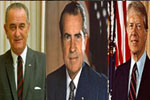 |
|
A Peek into the Minds of Political Donors Marketplace - Los Angeles In the world of mainstream politics, big campaign donors are as essential as air and water. Bill Zeeble talks with two campaign donors -- a Democrat and a Republican -- about the role of money in elections, how they got involved, why they give, and how they deal with critics. (04:51) |
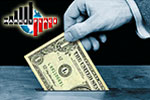 |
|
Campaign finance, European-Style Marketplace - Los Angeles As opposed to the lucre-soaked U.S. political process, not quite as much money flows in European election campaigns. So, what kinds of advantages do politicians use to get around campaign finance rules? And, what do astute political observers across "The Pond" say about the American way? Stephen Beard reports. (03:44) |
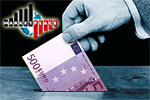 |
|
Small Business Trumps Large in Political Giving Marketplace - Los Angeles The auto industry often ranks near the top of political giving -- but itís the auto dealers whose checks often lead to a bigger payoff. And, the auto dealers have a larger role in local communities. Bill Poorman explores the role of small business in politics. (03:01) |
 |
|
Training Camp for Campaigners KERA - Dallas-Fort Worth, Texas Politics can be a cynical, cutthroat business - one that turns the public off as much as it entertains it. And yet it's an essential industry in our democracy. Here's an inside look at a weekend initiation of the next generation of political consultants and campaign professionals. (07:07) |
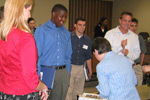 |
|
The best democracy money can buy Minnesota Public Radio - St. Paul, Minn. There are at least 40 millionaires in the United States Senate. Political watchdogs say they expect that number to increase because the national political parties are recruiting candidates who are wealthy and willing to spend millions of dollars of their own money to run for office. 'Self-financed' candidates say campaigning with their own money makes them more independent of special interests. But critics worry the trend will make political campaigns more expensive and put public office out of reach for average Americans. (06:22) |
|
The Rise and Fall of Third Parties Minnesota Public Radio - St. Paul, Minn. It's been 15 years since an American president was elected with more than 50 percent of the popular vote. Minnesota has provided some of the most fertile ground for third-party candidates in recent years. Jesse Ventura of the Independence Party held the governor's office for four years, and the Green Party has won some local races in the state. Despite that slim fingerhold, third-party and independent candidates struggle for their infrequent victories. (07:30) |
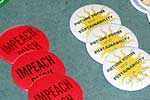 |
|
Lessons from the fall: A losing candidate's reflections Minnesota Public Radio - St. Paul, Minn. For every candidate who wins an election, there is another who experiences the agony of defeat. Many of them are newcomers to the world of politics, who get an eye-opening look at the inside of a campaign, from door knocking to raising money. (03:58) |
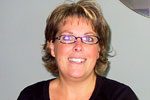 |
|
The Nation of Hawaii Outer Voices - Northern California When democracy is imposed in a place where people don't want it, is that democratic? Welcome to Hawaii, the 50th state, where many people would prefer a return to the monarchy over statehood. While there is no longer debate about the right to sovereign nationhood, there is still discussion about whether there isn't room for American democracy in Hawaii, after all. (08:00) |
 |
|
Small Stuff Democracy Michigan Radio - Southern Michigan You don't have to be a politician to have experience with democracy. In fact you don't even have to go to the polls. Many Americans spend their entire lives swimming in democratic concepts day in and day out. As Michigan Radio's Tamar Charney reports our sense of democracy is so ingrained that we look to voting and majority rule in our everyday lives. (7:23) |
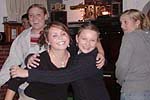 |
|
PAC Man Sesh Kannan - Washington, DC Overcoming fear, isolation, and prejudice, Muslims in Northern Virginia have staked a claim in the future of U.S. democracy. A new political action committee called the Platform for Active Civil Empowerment is rallying local Muslims to be politically active to register to vote, fundraise, and support political candidates. (06:30) |
|
Arab Americans: Democracy in a New Land Michigan Radio - Southern Michigan Many of the United States' four million Arab-Americans have adapted to life in the United States by building successful businesses in their communities. Many have also taken active roles in civic life, on both neighborhood and national levels. Michigan Radio's Michael Leland traveled to Dearborn, Michigan, and found that some Arab-Americans still struggle with certain aspects of democracy. (6:45) |
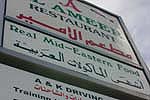 |
|
The Next Generation: Democracy on Campus Michigan Radio - Southern Michigan No one can predict the future, but today's political movements hint at the direction democracy is taking. On university campuses, students are more active than they have been in a decade. Tracy Samilton of Michigan Radio visits the University of Michigan - birthplace of Students for a Democratic Society - for a picture of student participation in democracy. (7:13) |
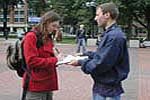 |
|
Cyber democracy and civic discourse Minnesota Public Radio - St. Paul, MN For years political observers have been lamenting the demise of old-style political discourse. The rise of the Internet and online community forums have given some people hope of luring increasingly disconnected public back into the political process. (05:49) |
 |
|
Democracy, American Style IndyBell Productions and Edithead, Inc. - Brooklyn, NY What do Americans really think about democracy? Hear the answers in a series of two-minute discussions we recorded at an apple cider-stand in Brooklyn. |
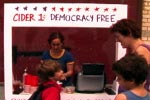 |
|
Grassroots Democracy by the Sea KPCC - Southern California Neighborhood councils have worked in other cities. Now they're being tried in LA. Robin Urevich visits Venice, California, where the council has become a battleground in a fight over gentrification. The process is a window on the challenges councils through the city face. (7:48) |
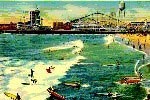 |
|
On Deaf Ears KUER FM90 - Salt Lake City, UT If politicians are supposed to represent us, why do we disagree with so much that is done in the name of public good? Producer Jenny Brundin looks at the question of whether we elect politicians for their individual wisdom or their commitment to accurately fight for our views. (7:41) |
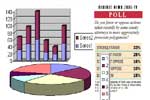 |
|
What it Takes to be a Good Citizen KUER FM90 - Salt Lake City, UT Is democracy just too hard for modern Americans? From Salt Lake City, writer Anne Milliken explores what it takes to be a good citizen in America today. She profiles two women in Utah. One believes her voice makes a difference in the political process, the other chooses to invest herself elsewhere. (7:18) |
 |
|
Politics as Family NHPR - New Hampshire Many Americans eye politics with suspicion. Itís seen as a world of clout, back room deals and less than sincere efforts to do public good. But for families long involved in the process, those elements are only part of the story. For one family in New Hampshire that grew up with politics around the kitchen table, itís too easy to call it dirty. (7:00) |
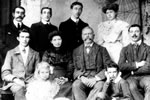 |
|
Norman Rockwell Was Wrong NHPR - New Hampshire The New England town meeting is often seen as the purest expression of American democracy. Norman Rockwell captured that feeling in his painting "Freedom of Speech," with a rough-hewn commoner standing and giving his opinion, while wealthier townspeople look on respectfully. But sometimes, small town government can seem almost like Washington. (06:00) |
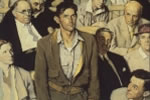 |
|
Big Money and Politics National Public Radio - Washington, D.C. Advocates of campaign-finance reform argue that major political contributors exercise undue influence over lawmakers. But the influence of money on U.S. politics is nothing new. Large contributions from big-business interests played a critical role in the 1896 election of President William McKinley. And a campaign finance scandal involving President Theodore Roosevelt led to the first major curb on corporate contributions, the 1907 Tillman Act. NPR's Peter Overby reports. |
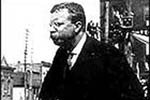 |
|
The Booming Line-Standing Business National Public Radio - Washington, D.C. One example of money's crucial role in Washington can be seen outside any important congressional hearing: paid line-standers, who often wait overnight to get seats for those lobbyists who can afford their services. It's a regular business, with wranglers who hire and supervise standers - and provide them with a regular paycheck. NPR's Peter Overby reports. |
|
The Outsiders National Public Radio - Washington, D.C. From former pro wrestler Jesse Ventura to general-turned-presidential hopeful Wesley Clark, a number of politicians have made bids for public office by running as government outsiders. NPR's Mara Liasson looks at the 'outsider' phenomenon and examines how it affects voters' views on government and democracy. |
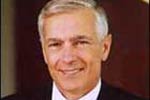 |
|
Voter Turnout, or Lack Thereof National Public Radio - Washington, D.C. As voting rights have expanded, the percentage of eligible people who actually vote has declined. NPR's Linda Wertheimer looks at the reasons behind low voter turnout. |
|
Lenape Democracy PeaceTalks - Philadelphia, PA The Native Americans of the Lenape Nation have inhabited Pennsylvania for well over a thousand years. Yet, the state has never formally acknowledged their existence, despite evidence that Native American traditions may have influenced the creators of our own constitution. Hear who's fighting for them and why. Blair Brown narrates. (05:31) |
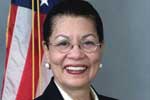 |
|
Keeping it Clean KJZZ - Phoenix, AZ The Clean Campaign movement encourages public financing of campaigns and forces candidates to agree to raise the bulk of their money from citizens. Mark Moran reports on whether this effort is really cleaning up campaigns and how it's faring in other states. (04:08) |
|
Revolution South of LA KPCC - Southern California Early this year, South Gate removed a corrupt government with a recall election. KPCC's Adolfo Guzman Lopez covered that race. In this feature, he returns to South Gate to see how the new democracy is working. (08:21) |
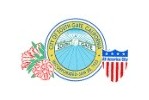 |